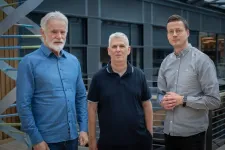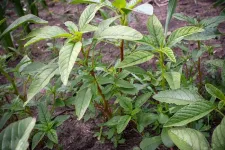(Press-News.org) Whether talking about the office kitchen, hiking trails or ratings on Yelp, there are always people who put in effort to leave those spaces better. There are also those who contribute nothing to that public good.
New research using large-scale online experiments suggests that rewarding people to contribute to a virtual public good, such as a simulated online rating for a ferry system, increased the accuracy of the ratings and improved the overall quality of that resource.
The multidisciplinary team, including researchers from the University of California, Davis; Hunter College, College of New York; the Max Planck Institute for Empirical Aesthetics; and Princeton University tested ideas about collective action in a simulation incorporating more than 500 people worldwide. Team expertise included communication science, sociology, computer science, psychology and animal behavior.
The study was published this week in the Proceedings of the National Academy of Sciences.
“When you have a collective action problem, you either want to prevent a bad thing from happening or you want to harness all this energy to make a good thing happen,” said Seth Frey, an assistant professor of communication at UC Davis and co-author of the paper. Frey studies collective action, or the science of creating systems that can maintain shared resources.
He said the study could have broader applications for online retailers’ rating systems. “What our results could mean for Amazon ratings, Yelp stars, or clothing retailers is that if those sites gave rewards for engaging in reviews, they would not only attract more product ratings, but more accurate ratings, which helps everyone.”
Riding ferries for coins
The team developed a 3D virtual world where online players enjoyed a limited amount of time to collect coins on tropical islands. In the game, ferries that took players from island to island all traveled at different speeds.
The game included a rating system so players could help each other choose the fastest ferry. Those ratings were shared among all players. Some participants rated most or all the ferries, contributing to the public good, while others hardly rated any, researchers said.
“You just have to learn over time by exploring and testing which ones are best,” said Nori Jacoby, a research group leader at the Max Planck Institute for Empirical Aesthetics and a co-author on the study. “We made that a collective effort by letting people leave ratings so other people can learn quickly which ferry would be their best choice.”
Improving a public good
The public good represented in this game was the ferry ratings, but similar human behaviors in the real world affect online rating systems, forestry management and even climate change, researchers said. Frey said that in the game, leaving ratings was considered a pro-social act because it benefited everyone.
One of the challenges for maintaining a public good is the presence of free riders — or people who may participate and enjoy the resource but don’t contribute ratings. Just as there are people who don’t leave ratings on Yelp, not everyone left ratings for ferries in this study’s virtual world, either, researchers said.
But, when players were awarded coins for providing ratings, the proportion of players who left ratings at all increased from an average of 35% to 70%. Free riders who were responsive to incentives provided higher quality evaluations and balanced out the over-optimistic ratings of more intrinsically motivated contributors, researchers said. Players who had been providing ratings without a reward tended to rate ferries much better than they actually were.
“It’s a cruel irony that the folks least likely to participate for the collective good are the ones we most need due to their superior skills,” said Dalton Conley, Henry Putnam University Professor in Sociology at Princeton and a co-author on the study.
This study’s finding that rewards for improving a shared resource contrasted with previous research, the paper’s authors said.
In the game, incentives overcame the “collective action” problem related to the game’s ratings. The most common example of a collective action problem, said Frey, is the “tragedy of the commons,” where people destroy a shared resource — like a forest, a park or the office kitchen — by acting completely in their own self-interest. The incentives encouraged players to work together.
“We can just let people have personal experiences and learn for themselves or we effectively harness the knowledge of the collective in a way that benefits everybody,” said Frey.
END
People who contribute least in crowdsourcing can do the most to improve a public good
Rewarding people to give ratings increased accuracy and improved quality, researchers suggest
2023-11-08
ELSE PRESS RELEASES FROM THIS DATE:
1 in 25 carries a genotype that is associated with a shortened lifespan
2023-11-08
1 in 25 carries a genotype that is associated with a shortened lifespan
Scientists at deCODE genetics, a subsidiary of Amgen, have published a study on actionable genotypes detected in the Icelandic population and their association with lifespan. The results of this study are among the things that have motivated the government of Iceland to announce a nationwide effort in precision medicine. As the delivery of precision medicine to a population requires considerable amount of data on genomics, transcriptomics and proteomics of the population, Icelanders are currently exceptionally well suited for ...
Zen and the art of mitochondrial maintenance: The machinery of death makes a healthier life
2023-11-08
While we all aspire for a long lifespan, what is most coveted is a long period of vigor and health, or “healthspan,” that precedes the inevitable decline of advancing age. Researchers at UC Santa Barbara have discovered that instruments of death that cells use to commit suicide when things go wrong contribute to making a longer and healthier life by revitalizing the specialized cellular compartments called mitochondria.
Mitochondria generate the energy for all of our activities, from movement to thought. These power plants inside our cells descended ...
MPFI researcher awarded $1.2 Million from Chan Zuckerberg Initiative
2023-11-08
Dr. Vidhya Rangaraju has been named a recipient of the Chan Zuckerberg Initiative’s “Ben Barres Early Career Acceleration Award,” which will provide her lab with $1.2 million over four years to study dysfunctions of brain energy supply.
Dr. Rangaraju is a Research Group Leader at the Max Planck Florida Institute for Neuroscience (MPFI). With this award, her lab will investigate the causes of disrupted energy supply in neurons that lead to cognitive decline in amyotrophic lateral sclerosis (ALS). ...
With new grant, RPI works to shrink microchips, expand semiconductor workforce
2023-11-08
Transistors — the tiny on-off switches inside microchips — have gotten smaller and smaller over the years, increasing computing power and enabling smaller devices. During that time, the copper wires that connect these switches have likewise shrunk.
However, smaller, thinner wires create a big problem, said Daniel Gall, professor of materials science and engineering at Rensselaer Polytechnic Institute.
“The job of the wire is to conduct electrons — electricity. Imagine a wire as a crowded hallway that the electrons have to get through. The narrower the hallway, the more the electrons bump into things and scatter. We call that resistance,” Gall ...
Single gene controls Corn Belt weed's resistance to soil-applied herbicide
2023-11-08
URBANA, Ill. — Waterhemp, the aggressive weed threatening Corn Belt crop production, is throwing curveballs once again, according to researchers at the University of Illinois Urbana-Champaign. The weed has famously developed resistance to not one or two, but seven herbicide sites-of-action classes, nearly exhausting the chemical tools farmers can use to defend their livelihood.
In a new Weed Science study, U. of I. researchers show that a single major gene is responsible for waterhemp’s resistance to S-metolachlor ...
Your education and income level may affect your survival, recovery from stroke
2023-11-08
EMBARGOED FOR RELEASE UNTIL 4 P.M. ET, WEDNESDAY, NOVEMBER 8, 2023
MINNEAPOLIS – People with low education and income levels may have a 10% increased risk of death or being dependent on others to complete daily tasks three months after a stroke compared to people with high education and income levels, according to new research published in the November 8, 2023, online issue of Neurology®, the medical journal of the American Academy of Neurology. The study does not prove that low education and income cause worse outcomes after stroke. It only shows an association.
“Compared ...
For epilepsy, yoga may be good for your mind
2023-11-08
EMBARGOED FOR RELEASE UNTIL 4 P.M. ET, WEDNESDAY, NOVEMBER 8, 2023
MINNEAPOLIS – For people with epilepsy, doing yoga may help reduce feelings of stigma about the disease along with reducing seizure frequency and anxiety, according to new research published in the November 8, 2023, online issue of Neurology®, the medical journal of the American Academy of Neurology.
“People with epilepsy often face stigma that can cause them to feel different than others due to their own health condition and that can have a significant impact on their quality of life,” said study author ...
Increasing workplace flexibility associated with lower risk of cardiovascular disease
2023-11-08
Embargoed for release: Wednesday, November 8, 4:00 PM ET
Key points:
In a randomized trial of the cardiometabolic impacts of workplace interventions designed to reduce work-family conflict, older employees and those at baseline higher risk for cardiometabolic disease saw their risk of developing cardiovascular disease decrease equivalent to five to 10 years of age-related cardiometabolic changes.
The study is among the first to assess whether changes to the work environment can affect cardiometabolic risk.
Boston, MA—Increasing workplace flexibility may lower employees’ risk of cardiovascular disease, according to a new ...
New interactive evidence-based mapping tool gives policymakers more insight into highly concentrated cannabis products
2023-11-08
After conducting the first scoping review of its kind, researchers at the University of Colorado Anschutz Medical Campus have developed an evidence based interactive mapping tool to assist policymakers as they consider regulating the concentration of THC in cannabis products and as more potent products move into the marketplace.
Their review, funded by the State of Colorado, was released today in the American Journal of Public Health (AJPH).
“We looked at studies that measured adverse or beneficial effects of high concentration ...
Independent monitoring of the WHO pandemic agreement is non-negotiable, experts say
2023-11-08
An accountability framework, including independent monitoring of state compliance, is critical for the pandemic agreement's success, according to researchers at Columbia University Mailman School of Public Health and affiliates at Spark Street Advisors. The paper and findings are published in BMJ Global Health.
“Countries signing up to a pandemic agreement is no guarantee of its effective implementation,” said Nina Schwalbe, adjunct assistant professor in the Department of Population and Family Health and principal visiting fellow at Columbia Mailman School. “Countries' lack of compliance with ...
LAST 30 PRESS RELEASES:
Scientists deliver new molecule for getting DNA into cells
Study reveals insights about brain regions linked to OCD, informing potential treatments
Does ocean saltiness influence El Niño?
2026 Young Investigators: ONR celebrates new talent tackling warfighter challenges
Genetics help explain who gets the ‘telltale tingle’ from music, art and literature
Many Americans misunderstand medical aid in dying laws
Researchers publish landmark infectious disease study in ‘Science’
New NSF award supports innovative role-playing game approach to strengthening research security in academia
Kumar named to ACMA Emerging Leaders Program for 2026
AI language models could transform aquatic environmental risk assessment
New isotope tools reveal hidden pathways reshaping the global nitrogen cycle
Study reveals how antibiotic structure controls removal from water using biochar
Why chronic pain lasts longer in women: Immune cells offer clues
Toxic exposure creates epigenetic disease risk over 20 generations
More time spent on social media linked to steroid use intentions among boys and men
New study suggests a “kick it while it’s down” approach to cancer treatment could improve cure rates
Milken Institute, Ann Theodore Foundation launch new grant to support clinical trial for potential sarcoidosis treatment
New strategies boost effectiveness of CAR-NK therapy against cancer
Study: Adolescent cannabis use linked to doubling risk of psychotic and bipolar disorders
Invisible harms: drug-related deaths spike after hurricanes and tropical storms
Adolescent cannabis use and risk of psychotic, bipolar, depressive, and anxiety disorders
Anxiety, depression, and care barriers in adults with intellectual and developmental disabilities
Study: Anxiety, gloom often accompany intellectual deficits
Massage Therapy Foundation awards $300,000 research grant to the University of Denver
Gastrointestinal toxicity linked to targeted cancer therapies in the United States
Countdown to the Bial Award in Biomedicine 2025
Blood marker from dementia research could help track aging across the animal world
Birds change altitude to survive epic journeys across deserts and seas
Here's why you need a backup for the map on your phone
ACS Central Science | Researchers from Insilico Medicine and Lilly publish foundational vision for fully autonomous “Prompt-to-Drug” pharmaceutical R&D
[Press-News.org] People who contribute least in crowdsourcing can do the most to improve a public goodRewarding people to give ratings increased accuracy and improved quality, researchers suggest


